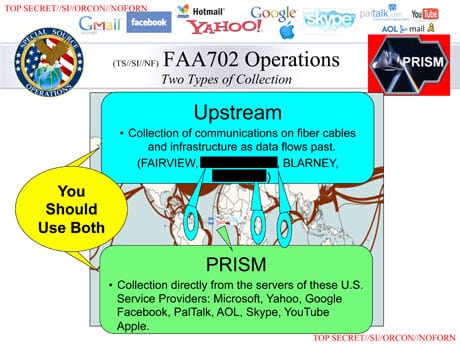The NSA PRISM is currently the most hotly-debated topic in the tech circles around the globe. The Guardian is leaking information on the program in batches and phases, continuing the series of exposes. Now, the paper has leaked a slide which suggests that the companies helped NSA in tapping their own servers.
As soon as the Guardian first reported how NSA was tapping into the data of companies such as Google, Facebook, Apple and many others, these companies started issuing official statements, citing how they were completely unaware of PRISM. This, some tech analysts have offered, is possible given how NSA could’ve tapped directly into Tier 1 networks.
However, a new slide leaked by Guardian shows that NSA was working on two strategies: one was to directly tap into fiber optic cables in order to gather data. And the other was to collect data directly from the servers of certain U.S. providers including Google, Yahoo, Microsoft, PalTalk, AOL, Skype, Facebook, YouTube and Apple.
It would seem that NSA was acting on both of its strategies as part of the PRISM program. This essentially puts the official denials of the aforementioned companies into question. Even the statements themselves are somewhat dubious, some of them suggesting that only ‘as little data as possible’ was handed over to agencies while others flatly refusing any cooperation with FBI or NSA.
If indeed these companies have been complicit with NSA in furnishing user data and information for ‘security reasons’, they need to come out with it and come out now. Any duplicity in their statements, if revealed in the coming future, will only jeopardize their reputations further.
Source: Guardian
Courtesy: The Verge
[ttjad keyword=”best-selling-gadget”]



